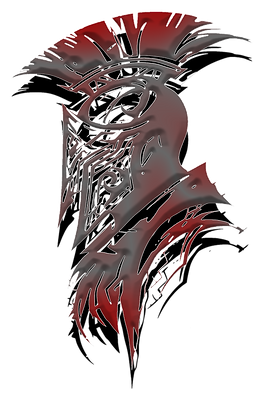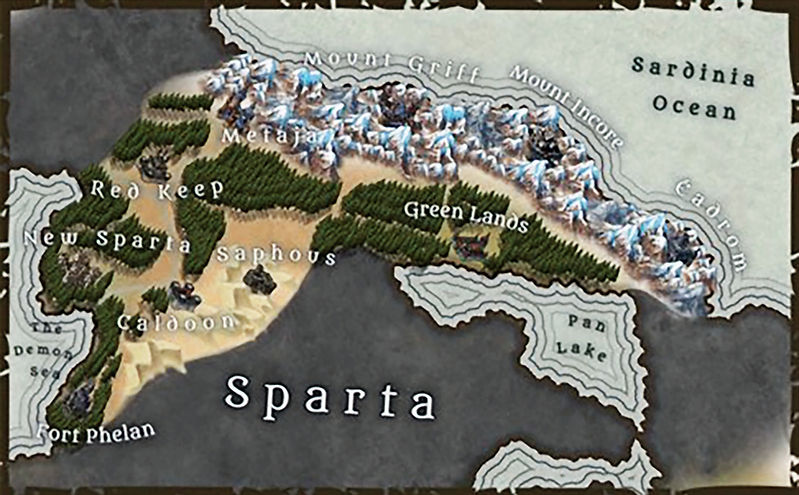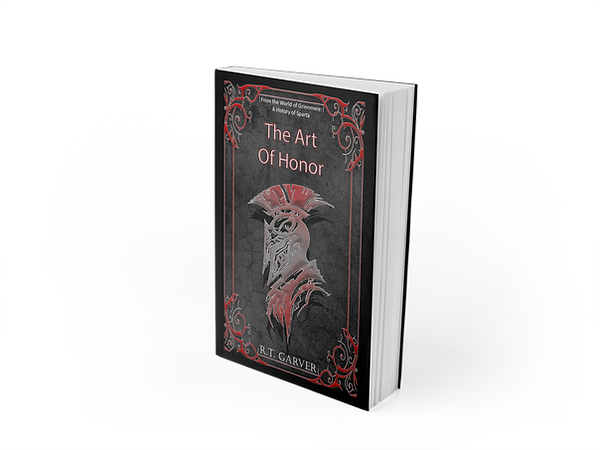


Sparta
In the year 2127 BCD, the Etrus Empire embarked on a significant expansion, annexing rural territories from neighboring villages. Among these territories was a region that would later be known as Sparta. This region was envisioned to play a crucial role in the Empire's ambitious project of creating a unified nation. However, maintaining control over the diverse and far-flung territories proved challenging for the Etrus Empire. The varied cultures, traditions, and allegiances within the newly acquired regions made it difficult to foster a sense of unity and national identity.
Over time, the Etrus Empire began to weaken. Its grip on the vast territories it had conquered loosened, and the once-mighty empire started to disintegrate. Regions that had been absorbed into the empire began to assert their autonomy. Among these were the territories in the region of Sparta, where local power struggles emerged. One of the most notable conflicts was the feud between Lord Minos of Goldar and Lord Roken of Salem, both influential figures in Sparta. This long-standing feud persisted for years, characterized by intermittent skirmishes and political maneuvering.
The feud between Minos and Roken escalated into a full-scale conflict when Minos was killed, and Goldar was destroyed. This event marked the beginning of the Dark War, a brutal and extended conflict that lasted from 9 BCD to 10 PC. The war saw the involvement of various factions and brought immense devastation to the region. Emperor Constant Etrus, the ruler of the Etrus Empire, lost his life on the battlefield during the Dark War, leaving no heir to succeed him. His death led to the final collapse of the Etrus Empire. Former cities of the empire, now independent territories, vied for power and control in the ensuing chaos.
Peace was eventually achieved when Lord Roken's stronghold, Salem, was left in ruins, and his whereabouts became unknown. This opened the door for negotiations to bring an end to the hostilities. In the year 10 PC, the Treaty of Midgardum was signed, establishing the continent of Midgardum, formerly known as Cordonia. To maintain peace between countries and their magical citizens, the Council of Magic, also known as the Knights of the Round Table, was formed. This council aimed to ensure that the use of magic was regulated and that conflicts could be resolved through dialogue and diplomacy.
In the year 101 PC, the region of Sparta was once again torn apart by internal strife. Tensions simmered beneath the surface until they erupted into full-blown conflict, known as the Spartan Civil War. The air buzzed with the sounds of clashing swords and the cries of battle as the Spartan military faced off against a determined faction of citizens called the Order.
The war, which raged for five relentless years, painted the land with scenes of intense battles and political upheaval. Streets that once thrived with daily life now echoed with the drumbeats of war. The Order, driven by an unyielding desire for change and reform, fought valiantly against the established military might of Sparta. They carried banners of hope and chanted slogans of a new future, rallying more citizens to their cause with each passing day.
By 106 PC, the winds of change had blown decisively in favor of the Order. Their victory was not just on the battlefield but in the hearts and minds of the people. The once-imposing walls of the capital bore a new name: New Sparta, a symbol of fresh beginnings and the dawn of a new era. The old dictatorship crumbled, giving way to an oligarchy. The leaders of the Order, now known as the Spartan Order, stepped into power, their visions of reform shaping the future of the nation. The transformation was profound, as the halls of governance echoed with new voices and the promise of a reformed society took root in the soil of New Sparta.
Under the new governance structure, the Spartan military forces transformed into the Spartan Knights, a prestigious and disciplined organization renowned for their unwavering commitment to defending the nation. Clad in gleaming armor and bearing the emblem of a fierce lion, these warriors became the epitome of honor and strength, their rigorous training and strict code of conduct setting them apart as the guardians of New Sparta.
At the helm of this reformed government stood the Senator, a figure of immense authority whose word was law. The Senator's presence was commanding, their decisions swift and resolute, ensuring that the government could respond to any challenge with unmatched efficiency. The power vested in the Senator allowed for decisive action, instilling a sense of confidence and order within the populace.
Supporting the Senator were the esteemed "Dark Ten," a council of ten high-ranking experts, each distinguished by unique nicknames that reflected their specialized fields. These individuals were not just advisors; they were the pillars of Sparta's new hierarchy. Among them was "The Strategist," known for unparalleled military acumen, and "The Sage," a master of diplomacy and wisdom. Their expertise spanned various critical domains, from economics and technology to health and education.
The influence of the Dark Ten was profound. In the grand hall where policies were shaped, their voices carried weight, their insights driving decisions that ensured the stability and prosperity of New Sparta. Each member's contributions were vital, creating a balanced and dynamic leadership team. Together, they navigated the complexities of governance, their combined knowledge and skills forging a path toward a brighter future for all Spartans.
The Dark Ten wielded immense power in shaping the destiny of New Sparta. Each member, a luminary in their domain, brought unparalleled expertise and insights to the Senator, guiding the nation's path. Their influence was far-reaching, touching every corner of Spartan life.
In the war rooms, their strategic acumen was unmatched, crafting military tactics that ensured Sparta's dominance on the battlefield. Their decisions, often shrouded in secrecy, were executed with precision, leading to decisive victories and the expansion of Spartan territories.
Economically, their policies fostered growth and stability. The Dark Ten implemented reforms that revitalized trade, stabilized the currency, and encouraged innovation. They were the architects of Sparta's economic resurgence, transforming it into a hub of prosperity.
Technologically, they were visionaries, driving advancements that placed Sparta at the forefront of innovation. Their support for scientific research and development led to groundbreaking discoveries and the integration of cutting-edge technology into everyday life. This technological prowess became a cornerstone of Spartan society.
Culturally, the Dark Ten preserved and promoted the rich heritage of Sparta while encouraging new artistic expressions. They curated cultural programs that celebrated Spartan traditions and inspired national pride. Their efforts ensured a vibrant cultural scene, fostering unity and a shared sense of identity among the people.
The cohesion of the Dark Ten was the linchpin of their success. Their ability to work seamlessly together, despite their diverse fields of expertise, created a synergy that propelled Sparta forward. This unity was instrumental in the transformation of Sparta into a formidable and stable nation, showcasing the true power of collective wisdom and leadership.
New Sparta blossoms into an era of renaissance, where the lessons of the past shape the aspirations of the future. The region, once a battleground of empires, now becomes a beacon of peace and progress. The Spartan Order fosters advancements in governance, culture, and technology, reflecting a harmonious blend of tradition and modernity. Streets once scarred by conflict now buzz with the sounds of industry and commerce, and the spirit of cooperation prevails.
The journey from the expansion of the Etrus Empire in 2127 BCD to the establishment of New Sparta in 106 PC is a saga of ambition, conflict, and transformation. The various events and key figures, from the feuding lords of Sparta to the influential Dark Ten, have shaped the region's history in profound ways. The legacy of these developments continues to influence the political, social, and cultural landscape of Midgardum, reflecting the enduring impact of historical events on the present and future.






